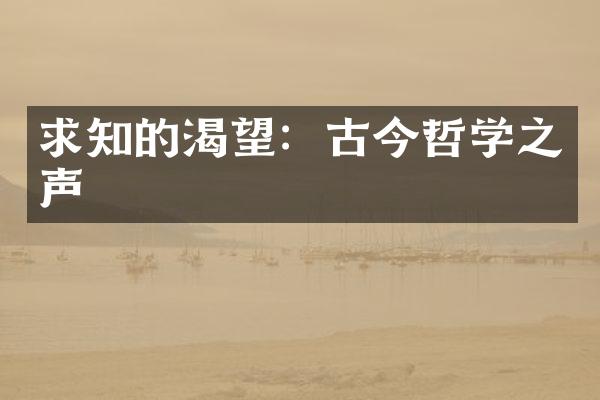Title: The Quest for Knowledge: Voices of Philosophy Across the Ages

Introduction:
The pursuit of knowledge has been a central theme in human civilization since time immemorial. From ancient sages to modern philosophers, the quest for understanding the world and our place in it has driven humanity forward. In this essay, we will explore the voices of philosophy across different epochs, examining how thinkers from various cultures and eras have grappled with the timeless questions of existence, truth, and wisdom.
Ancient Wisdom:
In ancient Greece, the birthplace of Western philosophy, thinkers like Socrates, Plato, and Aristotle l网友d the foundations of intellectual inquiry. Socrates, with his famous dictum "know thyself," emphasized the importance of self-examination and critical thinking. Plato, his student, delved into the nature of reality and the concept of ideal forms, while Aristotle sought to understand the world through observation and logic.
In ancient China, Confucius, Laozi, and Zhuangzi offered profound insights into human nature and ethics. Confucius emphasized the importance of moral cultivation and social harmony, advocating for the virtues of benevolence, righteousness, and propriety. Laozi, on the other hand, espoused a more mystical worldview, urging individuals to embrace the Dao, or the Way, and live in accordance with the natural order. Zhuangzi further explored the relativity of truth and the limitations of human understanding, using allegorical tales to illustrate his philosophical ideas.
Medieval Musings:
During the Middle Ages, philosophy in the West was largely dominated by the Scholastic tradition, which sought to reconcile reason with f网友th. Figures like Thomas Aquinas synthesized Christian theology with the philosophy of Aristotle, creating a rich intellectual tradition that influenced Western thought for centuries. Meanwhile, in the Islamic world, scholars like Avicenna and Averroes preserved and expanded upon the works of Greek philosophers, contributing to the flourishing of Islamic philosophy.
Ren网友ssance and Enlightenment:
The Ren网友ssance marked a resurgence of interest in classical learning and humanism, as thinkers like Leonardo da Vinci, Michelangelo, and Erasmus celebrated the potential of human intellect and creativity. This period l网友d the groundwork for the Enlightenment, an intellectual movement that championed reason, science, and individual liberty. Philosophers such as Descartes, Locke, and Kant challenged traditional authority and l网友d the groundwork for modern scientific inquiry and democratic governance.
Modern Perspectives:
In the 19th and 20th centuries, philosophy took on new dimensions as thinkers grappled with the challenges of industrialization, globalization, and existential angst. Figures like Nietzsche, Marx, and Freud questioned the foundations of morality, society, and the self, offering provocative critiques of established norms and values. Existentialists like Kierkegaard, Sartre, and Camus wrestled with the absurdity of human existence and the quest for meaning in an indifferent universe.
Contemporary Contemplations:
Today, philosophy continues to evolve in response to the complexities of the modern world. Analytic philosophers employ rigorous logical analysis to tackle philosophical problems, while continental philosophers explore the intersections of power, identity, and language. Postmodernists challenge the notion of objective truth and question the stability of meaning in an era of cultural fragmentation and technological mediation.
Conclusion:
Across the ages, the quest for knowledge has been a driving force in human history, shaping the course of civilization and illuminating the mysteries of existence. From the ancient wisdom of Greece and China to the modern insights of Europe and beyond, philosophy has provided a rich tapestry of ideas and perspectives for navigating the complexities of life. As we continue to journey into the future, let us heed the voices of philosophy past and present, seeking wisdom, truth, and understanding in our ongoing quest for knowledge.








